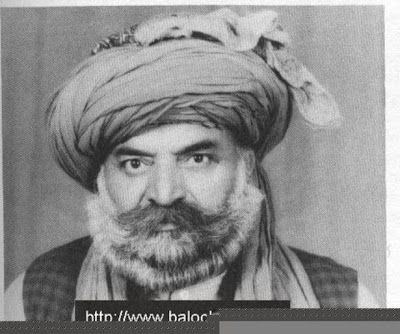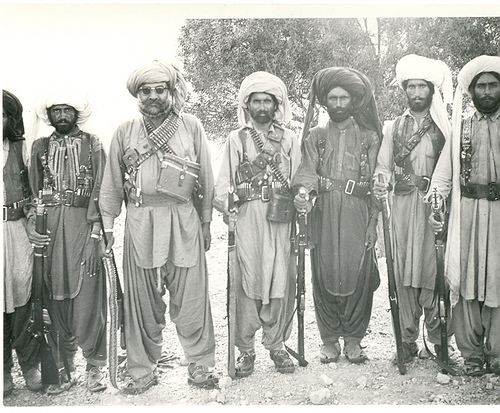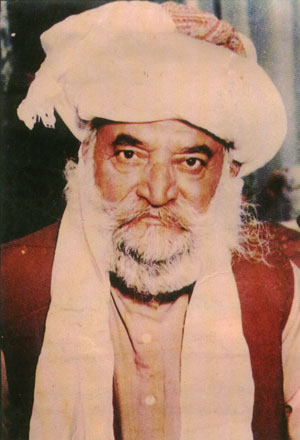SHER MOHAMMED MARRI was a living legend for half a century amongst Pakistan’s Baloch people. As a Marxist, nationalist politician and guerrilla leader he spent a lifetime fighting first the British and then the Pakistan army in an attempt to gain an honourable status for the Baloch tribe. When he was not in the mountains with his guerrillas he was either in jail or in exile.
He was born in Kohlu, a small village in the Marri tribal area, the son of a minor clan chieftain of the Marri tribe. Sher Mohammed was completely self-educated and during the British Raj he travelled all over India meeting people while doing odd jobs to earn a living. In Bombay he came under the influence of Marxists belonging to the pro-Moscow Communist Party of India (CPI) but he remained an outsider amongst the largely westernised and elitist CPI leaders. Moreover, he never favoured their ideas of a proletarian revolution against the British. Rather he saw revolution in terms of nationalism and mobilising the smaller nationalities and in that sense he was part of the tradition of Mao and Ho Chi Minh rather than Lenin. He was jailed several times by the British and for a time was banned from Balochistan.
In Balochistan he became well known for his fervent political writings, his poetry and his translation of Baloch epic poetry into Urdu and other languages. A self-taught intellectual, he could discuss any subject under the sun and spoke English and all five languages of Pakistan. In 1947, as the British left India, he joined the Baloch nationalists in their abortive attempt to create an independent Balochistan. There was a brief uprising against the Pakistan army in 1948 in which he participated but which was quickly crushed.
His finest hour came in the 1960s when for five years he led a guerrilla war against the military dictatorship of President Ayub Khan. He based himself in the Murri hills south of Quetta, from where his forces launched guerrilla attacks against the army and then fought a two-week pitched battle against an entire division, bringing the government’s offensive to a standstill. When a ceasefire was negotiated after Ayub Khan fell from power in 1968, Sher Mohammed came down from the hill a hero for Baloch youth. He was nicknamed ‘General Sheroff’ and the ‘Che Guevara of Pakistan’.
When the Baloch again rose against the government of Zulfikar Ali Bhutto to demand greater provincial autonomy, Sher Mohammed was arrested in 1973 and spent four years in jail. Along with other Baloch leaders he went on trial for treason. When Bhutto fell and he was released he went into exile to Kabul, where the new Marxist regime offered sanctuary for Baloch rebels. He was joined in Kabul by his friend and mentor Sardar Khair Bux Murri, the chieftain of the Murri tribe, and some 10,000 Murri militants.
Sher Mohammed returned briefly to Pakistan after the fall of the Kabul government in April 1992 and then went to India for medical treatment. His last few years were spent in considerable anguish and political isolation as he saw the cause of Baloch nationalism evaporate. The Murris themselves became divided along clan lines as a bitter dispute raged between him and Khair Bux.
Sher Mohammed’s demands for greater autonomy for Pakistan’s smaller nationalities and an end to domination by the Punjabi military was vindicated by the war for independence in Bangladesh. This issue of provincial autonomy remained a considerable political problem in Pakistan. More than any other politician, Sher Mohammed was responsible for making the world aware of the Baloch people and their cause.



